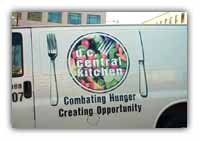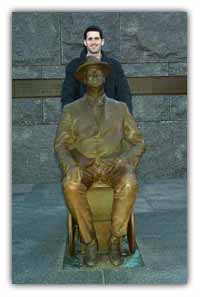 |




|
 |

Creating Jobs, Creating Opportunities: The New Deal and Today

"Brother can you spare a dime?"
Those are some of the words to a popular song on the radio in the 1930s. That was the time of the Great Depression, when millions of Americans had no job, very little food, and no place to live. Many of them begged on the streets, asking other people if they had even a dime to buy some bread (food was a lot less expensive than it is now). Sometimes, people were so upset and hungry that they smashed grocery store windows and stole fruit, canned goods, and meat. Many teenagers traveled around the country by hopping freight trains and "riding the rails." The Depression had destroyed everything in their young lives-their fathers had lost their jobs, they had been evicted from their homes, even their schools had closed down.
Franklin Delano Roosevelt was the president of the United States, and he knew he had to do something. He created a program called the New Deal, which was designed to give people jobs so that they could afford to buy food, clothing, and a house for themselves and their families.

|
 |
One of the most important programs in the New Deal was the Works Progress Administration (WPA). The WPA was created in 1935 to provide work, not welfare, to poor people. President Roosevelt knew that people usually feel better about themselves if they earn their own money, instead of having someone just give it to them. The WPA put people to work building 65,000 miles of road, 125,000 public buildings, 75,000 bridges, 8,000 parks and 800 airports. The WPA also created the National Youth Administration to give part-time work to students. The WPA also found jobs for thousands of actors, painters, sculptors, musicians and writers.

|
 |
Not everyone thought the WPA was a good idea, though. Some people said that that poor people were just lazy and shouldn't be helped at all. Unfortunately, many people still believe this is true, but it's not. Every night in the United States, 750,000 people are homeless. Some people, like Robert Egger, are helping the poor and homeless. The D.C. Central Kitchen (D.C.C.K.), in Washington, D.C., gets extra food from restaurants, hotels and other places that would otherwise just get thrown out. The people who work there - some of them used to homeless themselves! - prepare balanced meals and distribute them to those in need. Every day, 3,000 meals are given to the poor in homeless shelters, senior citizen centers and after-school programs.

|
 |
So what can you do about the problem? The first and most important thing is to learn as much as you can about the homeless and poor. Street people are only a small portion of the homeless and poor people in this country. Maybe you can even become a volunteer to help get toys or food to people who don't have as much as you do. The best we can all do is to help those who have less than we do.
--Neda
Neda
Please email me at:
neda@ustrek.org
Links to Other Dispatches
Daphne - Eleanor Roosevelt: An incomparable pioneer
Rebecca - Together we can make a difference!
Nick - It was a hard knock life during the Depression
|



